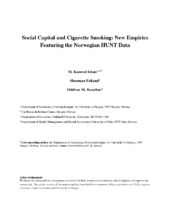Social capital and cigarette smoking: New empirics featuring the Norwegian HUNT data
Peer reviewed, Journal article
Accepted version
Permanent lenke
https://hdl.handle.net/1956/18304Utgivelsesdato
2017Metadata
Vis full innførselSamlinger
- Department of Economics [287]
Originalversjon
Economics and Human Biology. 2017, 26, 174-185. https://doi.org/10.1016/j.ehb.2017.04.003Sammendrag
Using a rich Norwegian longitudinal data set, this study explores the effects of different social capital variables on the probability of cigarette smoking. There are four social capital variables available in two waves of our data set. Our results based on probit (and OLS) analyses (with municipality fixed-effects) show that the likelihood of smoking participation is negatively and significantly associated with social capital attributes, namely, community trust (–0.017), participation in organizational activities (–0.032), and cohabitation (–0.045). Significant negative associations were also observed in panel data, pooled OLS, and random effects models for community trust (–0.024; −0.010) and cohabitation (–0.040; −0.032). Fixed-effects models also showed significant negative effects for cohabitation (–0.018). Estimates of alternative instrumental variables (IV) based on recursive bivariate probit and IV-GMM models also confirmed negative and significant effects for three of its characteristics: cohabitation (–0.030; −0.046), community trust (–0.065; −0.075), and participation in organizational activities (–0.035; −0.046). The limitations of our conclusions are discussed, and the significance of our study for the field of social capital and health is described, along with suggested avenues for future research.

